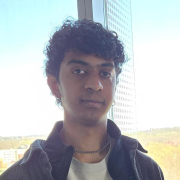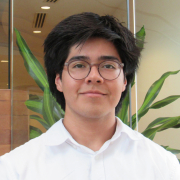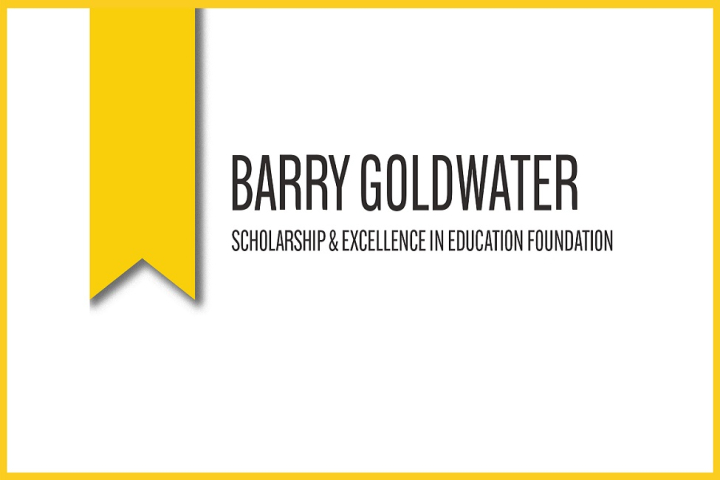Two CS Terps Awarded 2025 Goldwater Scholarships
Two computer science majors have been awarded 2025 scholarships by the Barry Goldwater Scholarship and Excellence in Education Foundation, which encourages students to pursue advanced study and research careers in the sciences, engineering and mathematics.
Over the last 16 years, UMD’s nominations yielded 53 scholarships—second in the nation only to Stanford.
UMD’s 2025 Goldwater Scholars are:
- Harikesh Kailad, sophomore computer science and mathematics double major
- Luiz Mata Lopez, junior computer science and mathematics double major
They are among 441 Goldwater Scholars selected from 1,350 nominees nationally. Goldwater Scholars receive one- or two-year scholarships that cover the cost of tuition, fees, books, and room and board up to $7,500 per year.
“I am very proud of the students whose amazing scholarship, dedication and hard work represent what CMNS strives for,” CMNS Dean Amitabh Varshney said. “Being named a Goldwater Scholar is an incredible accomplishment, and I cannot wait to see how they use this opportunity to make an even greater impact on the world.”
Since the program's first award in 1989, the Goldwater Foundation has honored 86 winners and five honorable mentions from UMD.
“The 2025 UMD Goldwater scholars are an exceptional group whose current and future research will impact science and society,” said CMNS Associate Dean of Undergraduate Education Robert Infantino, who has led UMD’s Goldwater Scholarship nominating process since 2001. “I am especially delighted that a UMD transfer student nominee was named a Scholar for the first time. The competition is also extra challenging for sophomores, so Hari’s accomplishment is also particularly noteworthy.”
Harikesh Kailad
Kailad began conducting research at UMD with Computer Science Professor Bill Gasarch in high school. He currently works in the Maryland Cybersecurity Center with Computer Science Assistant Professor Ian Miers, building systems that enable forums that both preserve privacy and allow for moderation, which helps prevent spammers and trolls. Kailad developed a full-fledged flexible system that allows services such as Wikipedia and Reddit to use his framework. He also began working on a project using multiparty computation for anonymous private state, which is when two or more parties receive an output of a computation based on their combined data without revealing their own data to the other parties.

"Hari has shown consistent initiative, pushing himself in coursework, research and teaching,” Miers said. “As a freshman, he taught a student-led class on binary exploitation with an ambitious plan to cover beyond what is covered in even the upper-level security class. At the same time, he completed an independent study with me on zero-knowledge proofs that resulted in a paper to appear at USENIX Security 2025, a top-tier peer-reviewed venue in computer security research.”
Kailad also works with Dana Dachman-Soled, an associate professor of electrical and computer engineering, on the security of post-quantum systems. This collaboration began when Kailad participated in the Research Experience for Undergraduates in Combinatorics, Algorithms, and AI for Real Problems at UMD.
Cryptography currently used to secure the web is vulnerable to attacks by quantum computers, but the security of post-quantum cryptosystems being deployed is not well studied. Kailad wrote code to attack Kyber, a post-quantum cryptosystem finalized by the NIST standardization process. His attack transforms side-channel information that leaks from the system into algebraic information that can then be used to attack the system and find secret keys.
Kailad serves as president of the Cybersecurity Club, designed and taught two student-initiated courses, cofounded a theoretical computer science reading group, and is a member of a top-ranking Capture the Flag team that participates in cybersecurity competitions on the international level. While at UMD, he received a CMNS Alumni Network Summer Research Award and a Maryland Cybersecurity Center Travel Grant.
After graduation, Kailad plans to pursue a Ph.D. in computer science and contribute to cryptography and private technology development.
“I am extremely excited about recent advancements in security and cryptography and strongly interested in bringing anonymity and privacy to the web by using and improving privacy-enhancing technologies and answering questions about the security and efficiency of such systems,” he said.
Luiz Mata Lopez
Mata Lopez is a first-generation college student who was directly admitted to UMD’s limited-enrollment computer science program as a transfer student from Montgomery College in fall 2023.

He was not unfamiliar with the College Park campus, though. He spent the summer of 2022 at UMD participating in a Research Experiences for Undergraduates program called BRIDGE (Bioinformatics Research In Data science for GEnomics), which is run by the UMD Center for Bioinformatics and Computational Biology. In the BRIDGE program, Mata Lopez worked with Computer Science Assistant Professor Erin Molloy to computationally address the problem of estimating the evolutionary histories of many species. Specifically, he worked to speed up the performance of an existing software package to improve usability for biologists.
After transferring to UMD, he rejoined Molloy’s research group to develop methods for fast reconstruction of tumor evolution. He conducted a preliminary study elucidating the detrimental effects of using standard approaches on cancer data and started working on multiple algorithms that address large-scale genome losses, which refer to a significant evolutionary process involving the deletion of extensive portions of a genome.
"Luiz is extremely talented. In our group meetings, he regularly presents his own algorithmic ideas at the whiteboard and responds to questions on the fly—skills typically honed during the transition from undergraduate to graduate studies,” Molloy said. “He is also deeply passionate about STEM research and has presented at Montgomery College and other forums to inspire fellow undergraduates to get involved. I am excited to see Luiz's proposed research come to fruition with the generous support of the Goldwater Scholarship."
Beginning in summer 2023, Mata Lopez interned at the National Institutes of Health’s National Library of Medicine on a project to use nanopore sequencing to elucidate the biological mechanisms of mobile DNA elements in the context of cancer development.
Last summer, he interned at the Broad Institute of MIT and Harvard on a dilated cardiomyopathy drug discovery pipeline. He merged imaging datasets from CRISPR and known responsive drug screens and analyzed them to identify gene edits that have similar effects as the drugs.
Mata Lopez served as a Montgomery College STEM Ambassador and received the Jack Kent Cooke Undergraduate Transfer Scholarship and Frederick Douglass Scholarship from UMD. His passion for education led him to create educational content with students nationwide to introduce biological sciences majors to bioinformatics software development.
Mata Lopez plans to pursue a Ph.D. in computer science, specializing in computational biology and statistical methods to better understand the origins of genetic disorders.
“I aim to address the genetic origins of diseases that have long mystified clinicians,” he said. “Recent computational advancements have enabled biomedical data analysis at an incredibly large scale and have led to a better understanding of disease mechanisms and rapid drug development.”
—Story by CMNS
The Department welcomes comments, suggestions and corrections. Send email to editor [-at-] cs [dot] umd [dot] edu.
